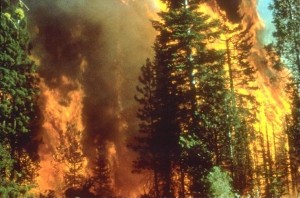 Many widely used phrases and bromides—including “mother nature” and “living in harmony with nature”—imply that nature is a benevolent and loving place. Yet natural disasters, such as the recent California Springs fire, show that nature can be lethal and that we need the products of industrial civilization to protect ourselves from its dangers.
Many widely used phrases and bromides—including “mother nature” and “living in harmony with nature”—imply that nature is a benevolent and loving place. Yet natural disasters, such as the recent California Springs fire, show that nature can be lethal and that we need the products of industrial civilization to protect ourselves from its dangers.
Tragically, this particular fire damaged fifteen homes and injured eight firefighters. Had area residents not been blessed with the fruits of industry the damage would have been far worse.
Imagine organizing and implementing an evacuation without televisions, Internet connections, telephones, radios. Imagine fleeing the area on foot with what you could carry in your hands, as “mother nature” intended, rather than by automobile with your precious possessions piled in the seats and trunk. Imagine seeing the fire approach a house made of “natural” logs and shingles rather than man-made fire-retardant siding and roofing. Imagine clearing away brush and grass by hand rather than by means of gasoline powered tools and tractors.
Untouched nature does not give us this technology; men and women who produce and run modern mass-production industrial facilities do.
“Nature” does not act like a loving mother. It acts like nature. At best, it leaves people naked, cold, hungry, and vulnerable; at worst it kills people with utter indifference.
Natural disasters, such as the California Springs fire, remind us that we should thank our real guardians: the men and women of industry and science.
Like this post? Join our mailing list to receive our weekly digest. And for in-depth commentary from an Objectivist perspective, subscribe to our quarterly journal, The Objective Standard.
Related:
- The British Industrial Revolution: A Tribute Freedom and Human Potential
- Does a Big Storm Require Big Government?
- HuffPo’s Sanghoee Uses Tragedy of Sandy to Smear Ayn Rand
Image: Wikimedia Commons












